Lecture 15
Compiler Infrastructure Clang/LLVM
Lecture
Outline
- LLVM Project: history and architecture
- LLVM IR
- Clang: parser and static analysis tool
- Clang Static Analyzer and its symbolic execution engine
- Clang Extra Tools: Clang-Tidy
Workshop
Outline
- Compiling/Installing LLVM
- Compiling C/C++ programs to executables and LLVM IR
- Exploring C/C++ programs with Clang (tokens, AST, call graph, CFG, exploded graph)
- Running Clang Static Analyzer
- Exploring Clang Static Analyzer and Clang-Tidy checks
Installing Clang
Clang is already installed in Mac OS. In Linux, it can be installed using the following command:
sudo apt install clang
Building Clang (optional, takes a long time)
For studying Clang source code, making experiments, and using features available to developers, it is recommended to clone its sources from GitHub and build them.
Warning: this may take several hours depending on your computer.
Cloning project from GitHub and checking out LLVM 20 (latest release):
git clone git@github.com:llvm/llvm-project.git
git checkout llvm-20
Installing visualization packages
Graphs that visualize internal data structures of a compiler are described in the DOT format and rendered to an image with the help of the Graphviz tool.
First, install the required visualization tools:
sudo apt install graphviz
sudo apt install gv
sudo apt install xdot
sudo apt install python3-distutils-extra
Second, install the Ninja build system. It solves the same task as GNU Make, but it has better performance (automatically generated scripts that efficiently parallelize build tasks).
sudo apt install ninja-build
Third, build and install LLVM compiler infrastructure (this is a debug build with some optimizations that reduce build time and size of the files). That is interesting, we build a debug version of Clang 20 with installed version of Clang 18.
cd /home/andrewt/Documents/src/llvm-project/
mkdir build
cd build
env CC=`which clang` CXX=`which clang++` cmake \
-DCMAKE_BUILD_TYPE=Debug \
-GNinja \
-DLLVM_ENABLE_PROJECTS='clang;clang-tools-extra' \
-DLLVM_TARGETS_TO_BUILD="X86" \
-DBUILD_SHARED_LIBS=ON \
-DLLVM_OPTIMIZED_TABLEGEN=ON \
-DLLVM_USE_SPLIT_DWARF=ON \
-DCMAKE_INSTALL_PREFIX=/home/andrewt/Programs/llvm/ \
../llvm
ninja install
export PATH=/home/andrewt/Programs/llvm/bin:$PATH
Building “Hello World” and viewing the build phases
Build and run the hello.c program:
clang hello.c -o hello
./hello
Hello!
Build and see the list of build phases:
clang hello.c -o hello -ccc-print-phases
+- 0: input, "hello.c", c
+- 1: preprocessor, {0}, cpp-output
+- 2: compiler, {1}, ir
+- 3: backend, {2}, assembler
+- 4: assembler, {3}, object
5: linker, {4}, image
Print the command run by Clang under the hood to build the program:
lang hello.c -o hello -###
clang version 20.1.5 (https://github.com/llvm/llvm-project.git 7b09d7b446383b71b63d429b21ee45ba389c5134)
Target: x86_64-unknown-linux-gnu
Thread model: posix
InstalledDir: /home/andrewt/Programs/llvm/bin
Build config: +unoptimized, +assertions
"/home/andrewt/Programs/llvm/bin/clang-20" "-cc1" "-triple" "x86_64-unknown-linux-gnu" "-emit-obj" "-dumpdir" "hello-" "-disable-free" "-clear-ast-before-backend" "-main-file-name" "hello.c" "-mrelocation-model" "pic" "-pic-level" "2" "-pic-is-pie" "-mframe-pointer=all" "-fmath-errno" "-ffp-contract=on" "-fno-rounding-math" "-mconstructor-aliases" "-funwind-tables=2" "-target-cpu" "x86-64" "-tune-cpu" "generic" "-debugger-tuning=gdb" "-fdebug-compilation-dir=/home/andrewt/Documents/src/hse/hse-acos-course/docs/part2os/15_Clang" "-fcoverage-compilation-dir=/home/andrewt/Documents/src/hse/hse-acos-course/docs/part2os/15_Clang" "-resource-dir" "/home/andrewt/Programs/llvm/lib/clang/20" "-internal-isystem" "/home/andrewt/Programs/llvm/lib/clang/20/include" "-internal-isystem" "/usr/local/include" "-internal-isystem" "/usr/lib/gcc/x86_64-linux-gnu/13/../../../../x86_64-linux-gnu/include" "-internal-externc-isystem" "/usr/include/x86_64-linux-gnu" "-internal-externc-isystem" "/include" "-internal-externc-isystem" "/usr/include" "-ferror-limit" "19" "-fgnuc-version=4.2.1" "-fskip-odr-check-in-gmf" "-fcolor-diagnostics" "-faddrsig" "-D__GCC_HAVE_DWARF2_CFI_ASM=1" "-o" "/tmp/hello-da670c.o" "-x" "c" "hello.c"
"/usr/bin/ld" "-z" "relro" "--hash-style=gnu" "--eh-frame-hdr" "-m" "elf_x86_64" "-pie" "-dynamic-linker" "/lib64/ld-linux-x86-64.so.2" "-o" "hello" "/lib/x86_64-linux-gnu/Scrt1.o" "/lib/x86_64-linux-gnu/crti.o" "/usr/lib/gcc/x86_64-linux-gnu/13/crtbeginS.o" "-L/usr/lib/gcc/x86_64-linux-gnu/13" "-L/usr/lib/gcc/x86_64-linux-gnu/13/../../../../lib64" "-L/lib/x86_64-linux-gnu" "-L/lib/../lib64" "-L/usr/lib/x86_64-linux-gnu" "-L/usr/lib/../lib64" "-L/lib" "-L/usr/lib" "/tmp/hello-da670c.o" "-lgcc" "--as-needed" "-lgcc_s" "--no-as-needed" "-lc" "-lgcc" "--as-needed" "-lgcc_s" "--no-as-needed" "/usr/lib/gcc/x86_64-linux-gnu/13/crtendS.o" "/lib/x86_64-linux-gnu/crtn.o"
Preprocessing
Preprocessing the test.c file (expanding all macros):
clang test.c -E
# 1 "test.c"
# 1 "<built-in>" 1
# 1 "<built-in>" 3
# 389 "<built-in>" 3
# 1 "<command line>" 1
# 1 "<built-in>" 2
# 1 "test.c" 2
void write_i(int);
void write_s(const char *);
void print(const char *s, int a) {
write_s(s);
write_i(a);
}
void foo(int x) {
print("Value of " "x", x);
int y, z;
if (x == 0)
y = 5;
print("Value of " "y", y);
if (!x)
z = 6;
print("Value of " "z", z);
}
See that the trace macro has been replaced by a call to function print and the integer argument
has been expanded to an additional argument holding its name.
Lexical analysis
Lexical analysis is the first stage of the compiler. During this stage, the compiler scans a stream to characters and builds tokens (that describe identifiers, keywords, operators, etc.):
clang -cc1 -dump-tokens test.c
void 'void' [StartOfLine] Loc=<test.c:3:1>
identifier 'write_i' [LeadingSpace] Loc=<test.c:3:6>
l_paren '(' Loc=<test.c:3:13>
int 'int' Loc=<test.c:3:14>
r_paren ')' Loc=<test.c:3:17>
semi ';' Loc=<test.c:3:18>
void 'void' [StartOfLine] Loc=<test.c:4:1>
identifier 'write_s' [LeadingSpace] Loc=<test.c:4:6>
l_paren '(' Loc=<test.c:4:13>
const 'const' Loc=<test.c:4:14>
char 'char' [LeadingSpace] Loc=<test.c:4:20>
star '*' [LeadingSpace] Loc=<test.c:4:25>
r_paren ')' Loc=<test.c:4:26>
semi ';' Loc=<test.c:4:27>
void 'void' [StartOfLine] Loc=<test.c:6:1>
identifier 'print' [LeadingSpace] Loc=<test.c:6:6>
l_paren '(' Loc=<test.c:6:11>
const 'const' Loc=<test.c:6:12>
char 'char' [LeadingSpace] Loc=<test.c:6:18>
star '*' [LeadingSpace] Loc=<test.c:6:23>
identifier 's' Loc=<test.c:6:24>
comma ',' Loc=<test.c:6:25>
int 'int' [LeadingSpace] Loc=<test.c:6:27>
identifier 'a' [LeadingSpace] Loc=<test.c:6:31>
r_paren ')' Loc=<test.c:6:32>
l_brace '{' [LeadingSpace] Loc=<test.c:6:34>
identifier 'write_s' [StartOfLine] [LeadingSpace] Loc=<test.c:7:3>
l_paren '(' Loc=<test.c:7:10>
identifier 's' Loc=<test.c:7:11>
r_paren ')' Loc=<test.c:7:12>
semi ';' Loc=<test.c:7:13>
identifier 'write_i' [StartOfLine] [LeadingSpace] Loc=<test.c:8:3>
l_paren '(' Loc=<test.c:8:10>
identifier 'a' Loc=<test.c:8:11>
r_paren ')' Loc=<test.c:8:12>
semi ';' Loc=<test.c:8:13>
r_brace '}' [StartOfLine] Loc=<test.c:9:1>
void 'void' [StartOfLine] Loc=<test.c:11:1>
identifier 'foo' [LeadingSpace] Loc=<test.c:11:6>
l_paren '(' Loc=<test.c:11:9>
int 'int' Loc=<test.c:11:10>
identifier 'x' [LeadingSpace] Loc=<test.c:11:14>
r_paren ')' Loc=<test.c:11:15>
l_brace '{' [LeadingSpace] Loc=<test.c:11:17>
identifier 'print' [StartOfLine] [LeadingSpace] Loc=<test.c:12:3 <Spelling=test.c:1:18>>
l_paren '(' Loc=<test.c:12:3 <Spelling=test.c:1:23>>
string_literal '"Value of "' Loc=<test.c:12:3 <Spelling=test.c:1:24>>
string_literal '"x"' [LeadingSpace] Loc=<test.c:12:3 <Spelling=<scratch space>:2:1>>
comma ',' Loc=<test.c:12:3 <Spelling=test.c:1:38>>
identifier 'x' [LeadingSpace] Loc=<test.c:12:3 <Spelling=test.c:12:9>>
r_paren ')' Loc=<test.c:12:3 <Spelling=test.c:1:41>>
semi ';' Loc=<test.c:12:11>
int 'int' [StartOfLine] [LeadingSpace] Loc=<test.c:13:3>
identifier 'y' [LeadingSpace] Loc=<test.c:13:7>
comma ',' Loc=<test.c:13:8>
identifier 'z' [LeadingSpace] Loc=<test.c:13:10>
semi ';' Loc=<test.c:13:11>
if 'if' [StartOfLine] [LeadingSpace] Loc=<test.c:14:3>
l_paren '(' [LeadingSpace] Loc=<test.c:14:6>
identifier 'x' Loc=<test.c:14:7>
equalequal '==' [LeadingSpace] Loc=<test.c:14:9>
numeric_constant '0' [LeadingSpace] Loc=<test.c:14:12>
r_paren ')' Loc=<test.c:14:13>
identifier 'y' [StartOfLine] [LeadingSpace] Loc=<test.c:15:5>
equal '=' [LeadingSpace] Loc=<test.c:15:7>
numeric_constant '5' [LeadingSpace] Loc=<test.c:15:9>
semi ';' Loc=<test.c:15:10>
identifier 'print' [StartOfLine] [LeadingSpace] Loc=<test.c:16:3 <Spelling=test.c:1:18>>
l_paren '(' Loc=<test.c:16:3 <Spelling=test.c:1:23>>
string_literal '"Value of "' Loc=<test.c:16:3 <Spelling=test.c:1:24>>
string_literal '"y"' [LeadingSpace] Loc=<test.c:16:3 <Spelling=<scratch space>:3:1>>
comma ',' Loc=<test.c:16:3 <Spelling=test.c:1:38>>
identifier 'y' [LeadingSpace] Loc=<test.c:16:3 <Spelling=test.c:16:9>>
r_paren ')' Loc=<test.c:16:3 <Spelling=test.c:1:41>>
semi ';' Loc=<test.c:16:11>
if 'if' [StartOfLine] [LeadingSpace] Loc=<test.c:17:3>
l_paren '(' [LeadingSpace] Loc=<test.c:17:6>
exclaim '!' Loc=<test.c:17:7>
identifier 'x' Loc=<test.c:17:8>
r_paren ')' Loc=<test.c:17:9>
identifier 'z' [StartOfLine] [LeadingSpace] Loc=<test.c:18:5>
equal '=' [LeadingSpace] Loc=<test.c:18:7>
numeric_constant '6' [LeadingSpace] Loc=<test.c:18:9>
semi ';' Loc=<test.c:18:10>
identifier 'print' [StartOfLine] [LeadingSpace] Loc=<test.c:19:3 <Spelling=test.c:1:18>>
l_paren '(' Loc=<test.c:19:3 <Spelling=test.c:1:23>>
string_literal '"Value of "' Loc=<test.c:19:3 <Spelling=test.c:1:24>>
string_literal '"z"' [LeadingSpace] Loc=<test.c:19:3 <Spelling=<scratch space>:4:1>>
comma ',' Loc=<test.c:19:3 <Spelling=test.c:1:38>>
identifier 'z' [LeadingSpace] Loc=<test.c:19:3 <Spelling=test.c:19:9>>
r_paren ')' Loc=<test.c:19:3 <Spelling=test.c:1:41>>
semi ';' Loc=<test.c:19:11>
r_brace '}' [StartOfLine] Loc=<test.c:20:1>
eof '' Loc=<test.c:20:2>
In fact, Clang combines lexical analysis and preprocessing: it collects token that come from different locations (current source file, included headers, and macros).
Syntactical analysis
The next compiler stage is to recognize syntactical structure of a source file. At this stage, the compiler uses tokens to build an Abstract Syntax Tree (AST).
Viewing AST as a text:
clang -cc1 -ast-dump test.c
TranslationUnitDecl 0x5cc40885cac8 <<invalid sloc>> <invalid sloc>
|-TypedefDecl 0x5cc40885d2f8 <<invalid sloc>> <invalid sloc> implicit __int128_t '__int128'
| `-BuiltinType 0x5cc40885d090 '__int128'
|-TypedefDecl 0x5cc40885d368 <<invalid sloc>> <invalid sloc> implicit __uint128_t 'unsigned __int128'
| `-BuiltinType 0x5cc40885d0b0 'unsigned __int128'
|-TypedefDecl 0x5cc40885d670 <<invalid sloc>> <invalid sloc> implicit __NSConstantString 'struct __NSConstantString_tag'
| `-RecordType 0x5cc40885d440 'struct __NSConstantString_tag'
| `-Record 0x5cc40885d3c0 '__NSConstantString_tag'
|-TypedefDecl 0x5cc40885d718 <<invalid sloc>> <invalid sloc> implicit __builtin_ms_va_list 'char *'
| `-PointerType 0x5cc40885d6d0 'char *'
| `-BuiltinType 0x5cc40885cb70 'char'
|-TypedefDecl 0x5cc40885da10 <<invalid sloc>> <invalid sloc> implicit __builtin_va_list 'struct __va_list_tag[1]'
| `-ConstantArrayType 0x5cc40885d9b0 'struct __va_list_tag[1]' 1
| `-RecordType 0x5cc40885d7f0 'struct __va_list_tag'
| `-Record 0x5cc40885d770 '__va_list_tag'
|-FunctionDecl 0x5cc4088aedc0 <test.c:3:1, col:17> col:6 used write_i 'void (int)'
| `-ParmVarDecl 0x5cc4088aecf0 <col:14> col:17 'int'
|-FunctionDecl 0x5cc4088aefa0 <line:4:1, col:26> col:6 used write_s 'void (const char *)'
| `-ParmVarDecl 0x5cc4088aeed0 <col:14, col:25> col:26 'const char *'
|-FunctionDecl 0x5cc4088af1c0 <line:6:1, line:9:1> line:6:6 used print 'void (const char *, int)'
| |-ParmVarDecl 0x5cc4088af068 <col:12, col:24> col:24 used s 'const char *'
| |-ParmVarDecl 0x5cc4088af0e8 <col:27, col:31> col:31 used a 'int'
| `-CompoundStmt 0x5cc4088af418 <col:34, line:9:1>
| |-CallExpr 0x5cc4088af308 <line:7:3, col:12> 'void'
| | |-ImplicitCastExpr 0x5cc4088af2f0 <col:3> 'void (*)(const char *)' <FunctionToPointerDecay>
| | | `-DeclRefExpr 0x5cc4088af278 <col:3> 'void (const char *)' Function 0x5cc4088aefa0 'write_s' 'void (const char *)'
| | `-ImplicitCastExpr 0x5cc4088af330 <col:11> 'const char *' <LValueToRValue>
| | `-DeclRefExpr 0x5cc4088af298 <col:11> 'const char *' lvalue ParmVar 0x5cc4088af068 's' 'const char *'
| `-CallExpr 0x5cc4088af3d8 <line:8:3, col:12> 'void'
| |-ImplicitCastExpr 0x5cc4088af3c0 <col:3> 'void (*)(int)' <FunctionToPointerDecay>
| | `-DeclRefExpr 0x5cc4088af348 <col:3> 'void (int)' Function 0x5cc4088aedc0 'write_i' 'void (int)'
| `-ImplicitCastExpr 0x5cc4088af400 <col:11> 'int' <LValueToRValue>
| `-DeclRefExpr 0x5cc4088af368 <col:11> 'int' lvalue ParmVar 0x5cc4088af0e8 'a' 'int'
`-FunctionDecl 0x5cc4088af4e0 <line:11:1, line:20:1> line:11:6 foo 'void (int)'
|-ParmVarDecl 0x5cc4088af450 <col:10, col:14> col:14 used x 'int'
`-CompoundStmt 0x5cc4088afbe8 <col:17, line:20:1>
|-CallExpr 0x5cc4088af688 <line:1:18, col:41> 'void'
| |-ImplicitCastExpr 0x5cc4088af670 <col:18> 'void (*)(const char *, int)' <FunctionToPointerDecay>
| | `-DeclRefExpr 0x5cc4088af590 <col:18> 'void (const char *, int)' Function 0x5cc4088af1c0 'print' 'void (const char *, int)'
| |-ImplicitCastExpr 0x5cc4088af6d0 <col:24, <scratch space>:2:1> 'const char *' <NoOp>
| | `-ImplicitCastExpr 0x5cc4088af6b8 <test.c:1:24, <scratch space>:2:1> 'char *' <ArrayToPointerDecay>
| | `-StringLiteral 0x5cc4088af5f0 <test.c:1:24, <scratch space>:2:1> 'char[11]' lvalue "Value of x"
| `-ImplicitCastExpr 0x5cc4088af6e8 <test.c:12:9> 'int' <LValueToRValue>
| `-DeclRefExpr 0x5cc4088af618 <col:9> 'int' lvalue ParmVar 0x5cc4088af450 'x' 'int'
|-DeclStmt 0x5cc4088af818 <line:13:3, col:11>
| |-VarDecl 0x5cc4088af718 <col:3, col:7> col:7 used y 'int'
| `-VarDecl 0x5cc4088af798 <col:3, col:10> col:10 used z 'int'
|-IfStmt 0x5cc4088af908 <line:14:3, line:15:9>
| |-BinaryOperator 0x5cc4088af888 <line:14:7, col:12> 'int' '=='
| | |-ImplicitCastExpr 0x5cc4088af870 <col:7> 'int' <LValueToRValue>
| | | `-DeclRefExpr 0x5cc4088af830 <col:7> 'int' lvalue ParmVar 0x5cc4088af450 'x' 'int'
| | `-IntegerLiteral 0x5cc4088af850 <col:12> 'int' 0
| `-BinaryOperator 0x5cc4088af8e8 <line:15:5, col:9> 'int' '='
| |-DeclRefExpr 0x5cc4088af8a8 <col:5> 'int' lvalue Var 0x5cc4088af718 'y' 'int'
| `-IntegerLiteral 0x5cc4088af8c8 <col:9> 'int' 5
|-CallExpr 0x5cc4088af9a8 <line:1:18, col:41> 'void'
| |-ImplicitCastExpr 0x5cc4088af990 <col:18> 'void (*)(const char *, int)' <FunctionToPointerDecay>
| | `-DeclRefExpr 0x5cc4088af928 <col:18> 'void (const char *, int)' Function 0x5cc4088af1c0 'print' 'void (const char *, int)'
| |-ImplicitCastExpr 0x5cc4088af9f0 <col:24, <scratch space>:3:1> 'const char *' <NoOp>
| | `-ImplicitCastExpr 0x5cc4088af9d8 <test.c:1:24, <scratch space>:3:1> 'char *' <ArrayToPointerDecay>
| | `-StringLiteral 0x5cc4088af948 <test.c:1:24, <scratch space>:3:1> 'char[11]' lvalue "Value of y"
| `-ImplicitCastExpr 0x5cc4088afa08 <test.c:16:9> 'int' <LValueToRValue>
| `-DeclRefExpr 0x5cc4088af970 <col:9> 'int' lvalue Var 0x5cc4088af718 'y' 'int'
|-IfStmt 0x5cc4088afad0 <line:17:3, line:18:9>
| |-UnaryOperator 0x5cc4088afa58 <line:17:7, col:8> 'int' prefix '!' cannot overflow
| | `-ImplicitCastExpr 0x5cc4088afa40 <col:8> 'int' <LValueToRValue>
| | `-DeclRefExpr 0x5cc4088afa20 <col:8> 'int' lvalue ParmVar 0x5cc4088af450 'x' 'int'
| `-BinaryOperator 0x5cc4088afab0 <line:18:5, col:9> 'int' '='
| |-DeclRefExpr 0x5cc4088afa70 <col:5> 'int' lvalue Var 0x5cc4088af798 'z' 'int'
| `-IntegerLiteral 0x5cc4088afa90 <col:9> 'int' 6
`-CallExpr 0x5cc4088afb70 <line:1:18, col:41> 'void'
|-ImplicitCastExpr 0x5cc4088afb58 <col:18> 'void (*)(const char *, int)' <FunctionToPointerDecay>
| `-DeclRefExpr 0x5cc4088afaf0 <col:18> 'void (const char *, int)' Function 0x5cc4088af1c0 'print' 'void (const char *, int)'
|-ImplicitCastExpr 0x5cc4088afbb8 <col:24, <scratch space>:4:1> 'const char *' <NoOp>
| `-ImplicitCastExpr 0x5cc4088afba0 <test.c:1:24, <scratch space>:4:1> 'char *' <ArrayToPointerDecay>
| `-StringLiteral 0x5cc4088afb10 <test.c:1:24, <scratch space>:4:1> 'char[11]' lvalue "Value of z"
`-ImplicitCastExpr 0x5cc4088afbd0 <test.c:19:9> 'int' <LValueToRValue>
`-DeclRefExpr 0x5cc4088afb38 <col:9> 'int' lvalue Var 0x5cc4088af798 'z' 'int'
Viewing AST as a picture (requires a debug build of Clang):
clang -cc1 -ast-view test.c
Function foo:

Function print:
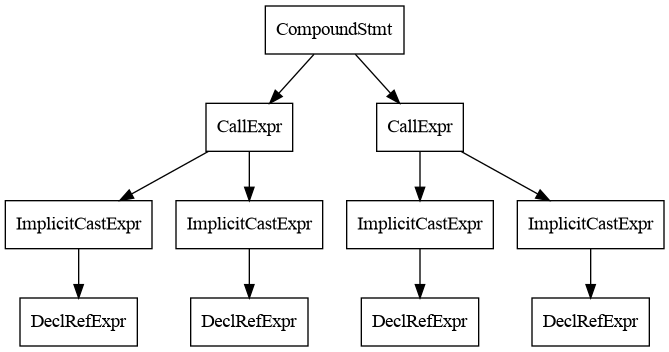
The structure of Clang AST is quite complex. There is no single inheritance hierarchy.
Instead, there are several hierarchies based on some main base classes.
Most of the nodes derive from the following main base classes:
Type,
Decl /
DeclContext or
Stmt.
Type, Decl and Stmt do not have a common ancestor.
Nodes of different types refer to each other.
For example, node VarDecl
(variable declaration like int x = 0) is derived from Decl and has method getType
that returns Type and method hasInit that returns Expr.
Node DeclRefExpr
(expression that refers to a variable or any other declaration like x in func(x))
has method getDecl that returns a corresponding declaration.
Semantic analysis
In Clang, semantic analysis is done together with AST construction (syntactical analysis).
It checks the semantic correctness of the code and adds additional attributes to the nodes.
E.g. variable usage DeclRefExpr is linked with its definition VarDecl.
So, Clang AST is not really a tree, but rather a graph.
Semantic checks includes the following tasks:
- Type checking: determining the data types of expressions to ensure they are compatible with operators and functions.
- Name resolution: finding the correct declarations (functions, variables, etc.) associated with names used in the code.
- Scope analysis: understanding where identifiers are valid and accessible.
The semantic analysis phase detects errors that cannot be detected during syntactical analysis, such as type conflicts, undeclared identifiers, or invalid uses of language features.
For example, here is a typical semantic issue “undefined variable” (not that the semantically invalid statement is excluded from the AST):
cat test2.c
int main() {
x = 10; // x is undefined
return 0;
}
clang -cc1 -ast-dump -ast-dump-filter=main test2.c
test2.c:2:3: error: use of undeclared identifier 'x'
2 | x = 10;
| ^
Dumping main:
FunctionDecl 0x5f3b252c02b8 <test2.c:1:1, line:4:1> line:1:5 main 'int ()'
`-CompoundStmt 0x5f3b252c0410 <col:12, line:4:1>
`-ReturnStmt 0x5f3b252c0400 <line:3:3, col:10>
`-IntegerLiteral 0x5f3b252c03e0 <col:10> 'int' 0
Code generation
The next stage is code generation. At this stage, Clang generates LLVM IR, intermediate representation that is used to apply ISA-independent optimizations. LLVM IR looks like a high-level assembly language that can be in two forms: textual and binary (so-called bitcode).
LLVM IR is based on SSA-form
(static single-assignment form). The main idea of this format is that every variable is assigned only once,
which means that, for each new assignment, a new version of a variable is created (e.g. %1, %2, etc.).
This format facilitates solving optimization tasks such as constant propagation, dead code elimination, etc.
In the end, when a real assembly code is generated, variables are mapped to real registers.
Translating source code to LLVM assembly (human-readable format):
clang -S -emit-llvm test.c -Xclang -disable-O0-optnone
cat test.ll
Note: flag is important -disable-O0-optnone to allow further IR optimizations.
The result looks as follows:
; ModuleID = 'test.c'
source_filename = "test.c"
target datalayout = "e-m:e-p270:32:32-p271:32:32-p272:64:64-i64:64-i128:128-f80:128-n8:16:32:64-S128"
target triple = "x86_64-unknown-linux-gnu"
@.str = private unnamed_addr constant [11 x i8] c"Value of x\00", align 1
@.str.1 = private unnamed_addr constant [11 x i8] c"Value of y\00", align 1
@.str.2 = private unnamed_addr constant [11 x i8] c"Value of z\00", align 1
; Function Attrs: noinline nounwind uwtable
define dso_local void @print(ptr noundef %s, i32 noundef %a) #0 {
entry:
%s.addr = alloca ptr, align 8
%a.addr = alloca i32, align 4
store ptr %s, ptr %s.addr, align 8
store i32 %a, ptr %a.addr, align 4
%0 = load ptr, ptr %s.addr, align 8
call void @write_s(ptr noundef %0)
%1 = load i32, ptr %a.addr, align 4
call void @write_i(i32 noundef %1)
ret void
}
declare void @write_s(ptr noundef) #1
declare void @write_i(i32 noundef) #1
; Function Attrs: noinline nounwind uwtable
define dso_local void @foo(i32 noundef %x) #0 {
entry:
%x.addr = alloca i32, align 4
%y = alloca i32, align 4
%z = alloca i32, align 4
store i32 %x, ptr %x.addr, align 4
%0 = load i32, ptr %x.addr, align 4
call void @print(ptr noundef @.str, i32 noundef %0)
%1 = load i32, ptr %x.addr, align 4
%cmp = icmp eq i32 %1, 0
br i1 %cmp, label %if.then, label %if.end
if.then: ; preds = %entry
store i32 5, ptr %y, align 4
br label %if.end
if.end: ; preds = %if.then, %entry
%2 = load i32, ptr %y, align 4
call void @print(ptr noundef @.str.1, i32 noundef %2)
%3 = load i32, ptr %x.addr, align 4
%tobool = icmp ne i32 %3, 0
br i1 %tobool, label %if.end2, label %if.then1
if.then1: ; preds = %if.end
store i32 6, ptr %z, align 4
br label %if.end2
if.end2: ; preds = %if.then1, %if.end
%4 = load i32, ptr %z, align 4
call void @print(ptr noundef @.str.2, i32 noundef %4)
ret void
}
attributes #0 = { noinline nounwind uwtable "frame-pointer"="all" "min-legal-vector-width"="0" "no-trapping-math"="true" "stack-protector-buffer-size"="8" "target-cpu"="x86-64" "target-features"="+cmov,+cx8,+fxsr,+mmx,+sse,+sse2,+x87" "tune-cpu"="generic" }
attributes #1 = { "frame-pointer"="all" "no-trapping-math"="true" "stack-protector-buffer-size"="8" "target-cpu"="x86-64" "target-features"="+cmov,+cx8,+fxsr,+mmx,+sse,+sse2,+x87" "tune-cpu"="generic" }
!llvm.module.flags = !{!0, !1, !2, !3, !4}
!llvm.ident = !{!5}
!0 = !{i32 1, !"wchar_size", i32 4}
!1 = !{i32 8, !"PIC Level", i32 2}
!2 = !{i32 7, !"PIE Level", i32 2}
!3 = !{i32 7, !"uwtable", i32 2}
!4 = !{i32 7, !"frame-pointer", i32 2}
!5 = !{!"clang version 20.1.5 (https://github.com/llvm/llvm-project.git 7b09d7b446383b71b63d429b21ee45ba389c5134)"}
Translating source code to LLVM bitcode (binary format):
clang -emit-llvm test.c
lang -emit-llvm -c test.c
file test.bc
test.bc: LLVM IR bitcode
Tools llvm-as and llvm-dis can be used to translate bitcode to LLVM format:
llvm-as test.ll -o test.bc
llvm-dis test.bc -o test.ll
Optimizations
In LLVM, optimizations are performed by the opt tool. It applies a number of passed to LLVM IR in order to transform it to an optimized forms.
The list of available passes can be printed with this command:
opt -print-passes
Let us start from debug passes that visualize LLVM IR. For example, the code below builds CFG (control-flow graph) of the functions in the LLVM IR module:
dot .print.dot -Tpng -o print.png
dot .foo.dot -Tpng -o foo.png
opt test.ll --passes=dot-cfg


Also, it is possible to visualize a call graph:
opt test.ll --passes=dot-callgraph
dot test.ll.callgraph.dot -Tpng -o test_callgraph.png
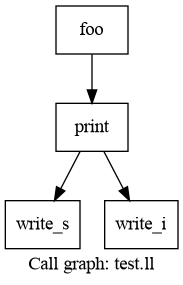
In general, optimizations are performed by traversing the CFG and tracking various facts related to control-flow and data-flow.
Example of optimization mem2reg (replacing stack-stored variables with registers):
opt -S -passes=mem2reg test.ll -o test_opt.ll
cat test_opt.ll
; ModuleID = 'test.ll'
source_filename = "test.c"
target datalayout = "e-m:e-p270:32:32-p271:32:32-p272:64:64-i64:64-i128:128-f80:128-n8:16:32:64-S128"
target triple = "x86_64-unknown-linux-gnu"
@.str = private unnamed_addr constant [11 x i8] c"Value of x\00", align 1
@.str.1 = private unnamed_addr constant [11 x i8] c"Value of y\00", align 1
@.str.2 = private unnamed_addr constant [11 x i8] c"Value of z\00", align 1
; Function Attrs: noinline nounwind uwtable
define dso_local void @print(ptr noundef %s, i32 noundef %a) #0 {
entry:
call void @write_s(ptr noundef %s)
call void @write_i(i32 noundef %a)
ret void
}
declare void @write_s(ptr noundef) #1
declare void @write_i(i32 noundef) #1
; Function Attrs: noinline nounwind uwtable
define dso_local void @foo(i32 noundef %x) #0 {
entry:
call void @print(ptr noundef @.str, i32 noundef %x)
%cmp = icmp eq i32 %x, 0
br i1 %cmp, label %if.then, label %if.end
if.then: ; preds = %entry
br label %if.end
if.end: ; preds = %if.then, %entry
call void @print(ptr noundef @.str.1, i32 noundef 5)
%tobool = icmp ne i32 %x, 0
br i1 %tobool, label %if.end2, label %if.then1
if.then1: ; preds = %if.end
br label %if.end2
if.end2: ; preds = %if.then1, %if.end
call void @print(ptr noundef @.str.2, i32 noundef 6)
ret void
}
attributes #0 = { noinline nounwind uwtable "frame-pointer"="all" "min-legal-vector-width"="0" "no-trapping-math"="true" "stack-protector-buffer-size"="8" "target-cpu"="x86-64" "target-features"="+cmov,+cx8,+fxsr,+mmx,+sse,+sse2,+x87" "tune-cpu"="generic" }
attributes #1 = { "frame-pointer"="all" "no-trapping-math"="true" "stack-protector-buffer-size"="8" "target-cpu"="x86-64" "target-features"="+cmov,+cx8,+fxsr,+mmx,+sse,+sse2,+x87" "tune-cpu"="generic" }
!llvm.module.flags = !{!0, !1, !2, !3, !4}
!llvm.ident = !{!5}
!0 = !{i32 1, !"wchar_size", i32 4}
!1 = !{i32 8, !"PIC Level", i32 2}
!2 = !{i32 7, !"PIE Level", i32 2}
!3 = !{i32 7, !"uwtable", i32 2}
!4 = !{i32 7, !"frame-pointer", i32 2}
!5 = !{!"clang version 20.1.5 (https://github.com/llvm/llvm-project.git 7b09d7b446383b71b63d429b21ee45ba389c5134)"}
Clang Static Analyzer
Dumping call graphs (Clang-level):
clang -cc1 -analyze -analyzer-checker="debug.DumpCallGraph" test.c
--- Call graph Dump ---
Function: < root > calls: print write_s write_i foo
Function: foo calls: print print print
Function: print calls: write_s write_i
Function: write_i calls:
Function: write_s calls:
Viewing call graphs (Clang-level):
clang -cc1 -analyze -analyzer-checker="debug.ViewCallGraph" test.c
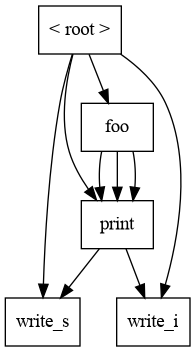
Viewing CFGs (Clang-level):
clang -cc1 -analyze -analyzer-checker="debug.ViewCFG" test.c
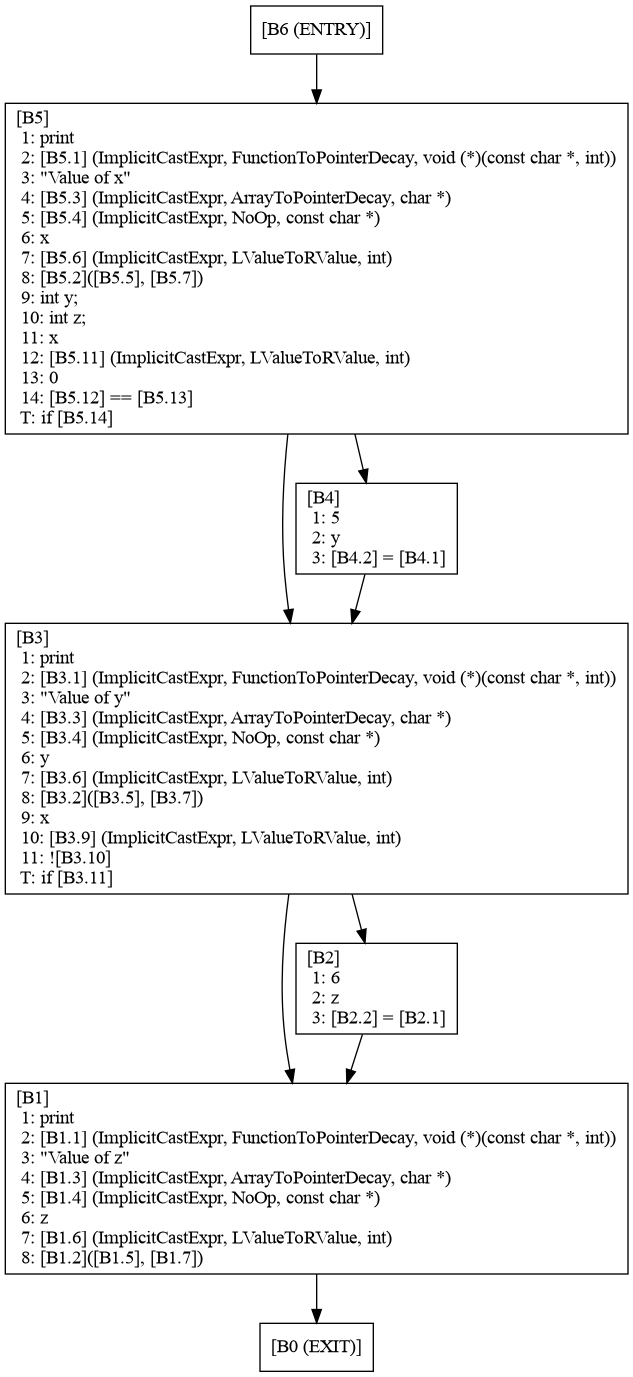
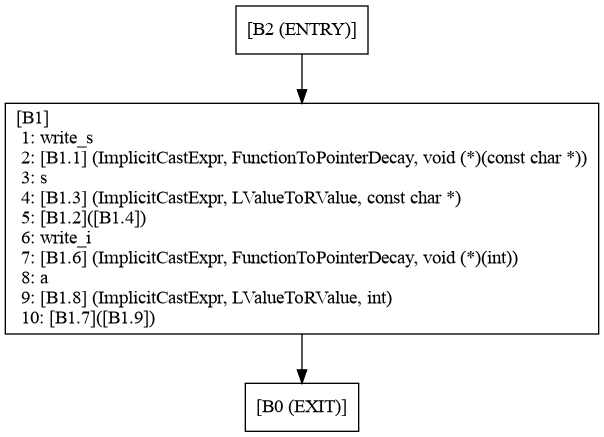
Viewing the exploded graph (unrolled CFG):
clang -cc1 -analyze -analyzer-checker="debug.ViewExplodedGraph" test.c
The exploded graph is here. Note: it is very large even for such a small function.
References
- LLVM (Wikipedia)
- Clang (Wikipedia)
- LLVM Web Site
- LLVM Project (GitHub)
- Michael Adams. Lecture Slides for the Clang Libraries (LLVM/Clang 15).
- Clang Static Analyzer - A Checker Developer’s Guide
- LLVM Language Reference Manual